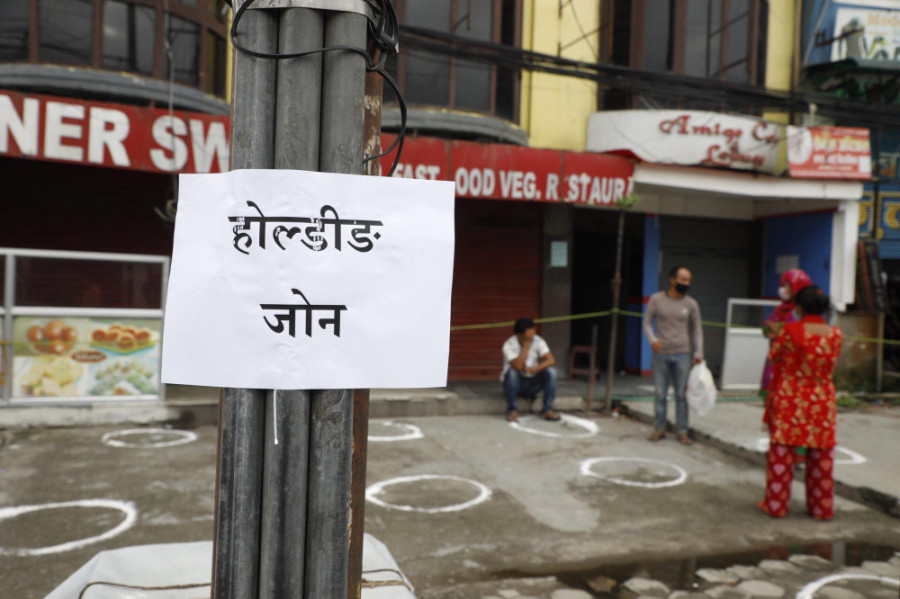Valley
Confusion and chaos as Valley residents wake up to new Covid-19 restrictions
A lack of clarity on opening timings of shops selling essential goods and who are allowed to move around and who are not creates hassles for the public and law enforcers.
Anup Ojha & Shuvam Dhungana
Kumar Timilsena had opened his store at Kupondole for just half an hour on Thursday morning when policemen came on motorcycles, sirens blaring, and told him to close his shop.
“I had just received a supply of milk from a dairy,” said the 40-year-old who operates a grocery store. “I guess the milk will go to waste now.”
Later he learned from another shop that police had been going around, announcing that stores would be allowed to open from 4am to 7am only.
On Tuesday evening, chief district officers of Kathmandu, Lalitpur and Bhaktapur issued prohibitory orders effective Wednesday midnight to contain the spread of the virus.
The orders say people should not come out of home unless for buying medicines and essentials, vehicles should remain off the roads and only those, including shops, providing essential services should operate.
When Nalini Shah, who lives in Bakhundole, went out to buy some foodstuff about 8am on Thursday, she did not find any shops open.
“I had gone to buy milk, but all shops were closed,” said Shah. “Nor could I buy vegetables.”
Local administrations’ prohibitory orders seem to be stricter compared to the lockdown days, but they have failed to properly inform the public.
“We had tentatively announced to allow shops selling daily essentials to open from 4am to 7am,” said Narayan Prasad Bhatta, chief district officer of Lalitpur.
When there was a nationwide lockdown from March 24, essential shops selling foodstuff had been allowed to open initially until 9am, which later had been extended until 10am and then the whole day.
The Tuesday decision of the chief district officers of the Valley, however, has created confusion among the people.
Without clarity on the timings for buying essential stuff, many in different parts of the city thronged various shops, disregarding safety protocols and physical distancing. Police even held some who were out for morning walks and jogging. They, however, were let go later on after spending some time in “holding centres” the police have set up at various places.
Police also stopped some who were on their way to office, as it was difficult for them to identify who was on essential services and who was not.
On Thursday, banks said that their staff coming to work were stopped by police and their motorcycles were impounded. They warned that they will not provide services on Friday if the movement of their staff is not facilitated.
Nepal Rastra Bank spokesman Gunakar Bhatta told the Post that the matter of obstruction of movement of the bank staff had been sorted out with the Home Ministry, as banks fall under the essential service category.
Later on Thursday, the Kathmandu District Administration Office issued a notice, saying that movement of vehicles carrying essential workers would be facilitated.
The Oli government’s decision to let chief district officers grant powers to issue prohibitory orders has already faced criticism with experts saying the move is against the spirit of the constitution, as it undermines provincial and local governments.
The government’s move of allowing local administrators to take their own measures to contain the spread of the virus comes amid widespread criticism that it largely failed in the fight against the pandemic.
The prohibitory orders in the Valley were issued after a sudden surge in the number of Covid-19 cases over the past weeks after the government lifted the nationwide lockdown on July 21.
The Health Ministry said 200 new cases were reported in Kathmandu Valley on Thursday–174 in Kathmandu, 18 in Lalitpur and eight in Bhaktapur. The total number of cases in Kathmandu Valley currently stands at 2,698—2151 in Kathmandu, 367 in Lalitpur, and 180 in Bhaktapur.
Local governments say they are helpless and that they are just facilitating the chief district officer’s orders.
“Our role is to disseminate the message of the district administration office, and we are implementing its decision,” said Raju Man Manandhar, spokesperson for Lalitpur Metropolitan City.
Lalitpur Chief District Officer Bhatta admitted that there were complaints from the public about confusion in timings—as to when the shops will open and till when they can buy foodstuff.
“We are having consultations over the issue,” Bhatta told the Post. “We may extend the period for buying and selling essential goods.”
He, however, was quick to add that it’s incumbent upon the local federal units to decide when it comes to managing shops.
In Kathmandu, too, shopkeepers said they were confused about the district administrators’ orders.
“Yesterday, police came and said there would be prohibitory orders from Thursday. But we were forced to close our shops after opening it for 15 minutes at 7am,” said Kiran Khanal, who owns a cold store in Dhobichaur. “We could not open the shops throughout the day.”
Rajeshwor Gyawali, administrative spokesperson for the Kathmandu Metropolitan City, said he is unaware of the District Administration Office’s decision regarding the timings for shops selling foodstuff.
Senior Superintendent Shyam Lal Gyawali, chief of the Kathmandu Metropolitan Police Range, said police were closing the shops as per the instructions from the local level.
“After assessing the risk in their areas, local authorities of every ward have allocated the time for shops to open,” said Gyawali. “Police are only assisting in effective implementation of a ward’s decisions.”




 14.24°C Kathmandu
14.24°C Kathmandu.jpg)















